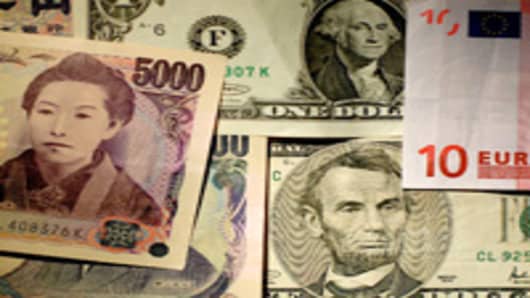The Group of Seven nations' firm pledge to help Japan stem the yen's rise could keep a bid in risk assets Friday, barring new negatives in Japan's nuclear crisis.
Oil should also continue to hold its gains after the U.N. security council approved a no-fly zone for Libya, after the U.S. market close. Oil jumped about 2 percent, above $103 per barrel in late trading, adding to a more than 3 percent gain earlier in the day.
The Yen fell sharply across all the major currencies and U.S. stock futures reversed course to edge higher, after the G-7 announcement at just about 8 p.m ET. Japan's stock market opened higher in Friday trading.
Following a conference call, the G-7 finance ministers and bankers issued a statementthat the U.S., U.K., Canada and the European Central Bank would join with Japan Friday in a concerted intervention in the foreign exchange market.
"This is a once in a decade kind of move," said Boris Schlossberg of GFT Forex. "Concerted intervention by the major powers against a particular currency or for a particular currency is very rare. It highlights the severity of the situation, and they do not want the markets to exacerbate the fragility of the Japanese economy."
"The strategy will work best if the situation in Fukushima is under control. If it's not under control, no amount of intervention would be able to stop persistent risk liquidation..."
"The strategy will work best if the situation in Fukushima is under control. If it's not under control, no amount of intervention would be able to stop persistent risk liquidation, which has been responsible for yen strength," he said. Japanese officials Thursday were working to restore power to the stricken nuclear plant so they could get equipment operating again that could help cool the reactors.
As the nuclear crisis in Japan grew more uncertain this week, the yen rose to an all time high against the dollar. Within the first hour of the G-7 statement, dollar yen moved above 81, well off its low below 77. "If everything around Fukushima stays relatively quiet, I think dollar yen stays above 80. Most likely in these types of scenarios, you get at least 24 hours of continuous flows if you don't get any exogenous shocks. If the specs are caught short, the natural forces of short covering and buying will squeeze the pair higher," Schlossberg said.
What to Watch
The U.S. has no economic data for Friday, but traders will certainly be watching Japan and developments in Libya and Bahrain. Bahrain opposition leaders were arrested Thursday, and tensions there added to oil's rise Thursday. Saudi Arabian King Abdullah speaks at 2 p.m. local time Friday in his first address to the nation since he returned from medical leave last month. He is expected to announce new decrees, and traders are watching to see if he mentions protesters or the move by the Saudi government to send troops to Bahrain.
"Saudi watchers speculate that the decrees will involve a series of economic reforms, including support for housing, and grants aimed at bolstering support across the kingdom. It’s also aimed at confirming that the King is definitely back on the job after the extended break for surgery and recovery," according to IHS CERA Chairman Daniel Yergin.
Libya will also be a big topic Friday. Oil traders have lowered their expectations for resumption of Libyan oil production, which accounted for just under 2 percent of the world's oil. A J.P. Morgan analyst Thursday compared Libya to Iraq, under Saddam Hussein.
"Even if oil production can technically resume, will we see UN sanctions or a consumer boycott of Libyan oil? To go from condemning Gaddafi to buying his oil in short order would be politically difficult, and while a sanctions would be financially painful for consuming countries, it would be an easier option if OPEC fully fills the gap," wrote analyst Laurence Eagles.
"After the first Gulf War, sanctions against Saddam Hussein’s regime were very effective: output fell rapidly from nearly 3.2 mbd to virtually zero, before hovering around 500-700 kbd for the next five years. A similar degree of effectiveness would limit Libyan production to domestic needs of around 250 kbd. In reality production will be higher as it is highly unlikely that even if sanctions are imposed they would have the same degree compliance or the military enforcement that was seen in Iraq," Eagles wrote.
Libyan leader Muammar Gadaffi showed no signs of ending his fight Thursday. He vowed to storm rebel-held Benghaziand show "no mercy, no pity."
"The oil infrastructure will certainly be in play in a scorched earth type of scenario," said energy analyst John Kilduff of Again Capital.
What Else to Watch
The 19 systemically important banks will be told the results of the Fed's stress tests Friday, and if they pass, institutions will start to tell shareholders about dividend hikes and buybacks. News of the expected test results hit news wires in the mid afternoon.
"It definitely bounced the group, but this is news everybody expected," said one trader. "We've been talking about it for months. Everybody knows they're going to get the wink and the nod tomorrow and make the an announcements Monday."
Stocks finished sharply higher Thursday with the Dow up 1.4 percent 11,774 and the S&P 500 up 1.3 percent at 1273.
Questions? Comments? Email us at marketinsider@cnbc.com




